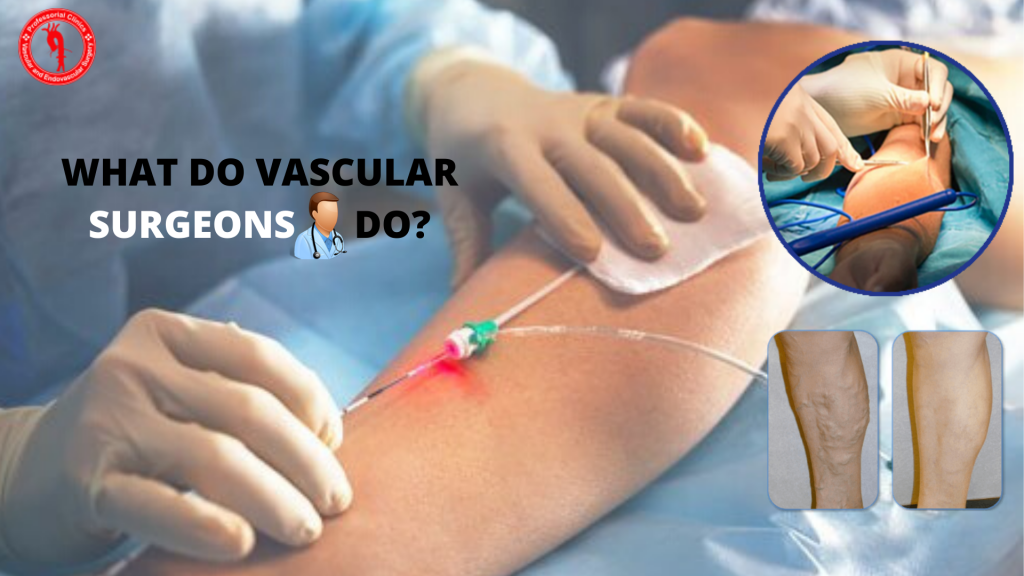
To know the answer of this question you ought to know about the vascular surgery. So, let’s understand it first – what is vascular surgery? Vascular surgery is an innovative surgical technique to treat the disorders of vascular systems or arteries, veins, and lymphatic systems. It encompasses of the diagnosis and comprehensive, longitudinal management of vascular diseases by minimally-invasive catheter procedures, and surgical reconstruction.
Vascular surgeons, sometimes also called endovascular surgeons, are those specialists who are highly trained to treat various types of vascular diseases. They have many roles and are responsible for diagnosing, managing and treating the conditions. A vascular surgeon diagnoses, treats and manages the disorders in your blood vessels, arteries carrying oxygen-rich blood and veins carrying blood back to the heart. They take care of entire circulatory system. The smooth flow of blood through the circulatory system is imperative. Without smooth flow of blood human body cannot function at all. Specialist vascular surgeon treat a range of problems such as spider and varicose veins, and life-threatening aneurysms. They can help patients manage the chronic problems throughout the lives.
Conditions Treated by Vascular and Endovascular Surgeons
There are a number of vascular conditions and blood vessels related problems that are treated by vascular and endovascular surgeons. An experienced endovascular and vascular surgeon treats conditions that affect the blood vessels in every part of human body except for brain and heart. Major conditioned treated and managed by vascular and endovascular surgeons may include:
- Aneurysm – A ballooning and weakened area in an artery.
- Atherosclerosis (commonly known as hardening of the arteries, also called atherosclerotic cardiovascular disease) – The build-up of fats, cholesterol and other substances in and on the artery walls.
- Carotid artery stenosis – Narrowing of the large arteries on either side of the neck that carry blood to the head, face and brain.
- Peripheral Artery Disease (PAD) – Narrowing of the blood vessels outside the heart and brain.
- Nutcracker Syndrome – A rare vein comparison disorder
- Thoracic Outlet Syndrome (TOS) – A group of disorders that occur when certain blood vessels or nerves are compressed.
- Deep vein thrombosis (DVT) – A blood clot in a deep vein, usually in the legs.
- Spider and Varicose Veins (Telangiectasia) – Disorders that happen when the valves in your veins don’t work appropriately.
- Arm Artery Disease – A circulatory condition in which the arteries in the arm become narrow or blocked
- Aortic Dissection (AD) – A tear in the inner layer of the large blood vessel branching off the heart (aorta).
- Abdominal Aortic Aneurysm (AAA) – An enlargement of the aorta, the main blood vessel that transports blood to the body, at the level of the abdomen.
- Hyperlipidemia – A disorder in which there are high levels of fat particles (lipids) in the blood.
- Connective Tissue Disorder (CTD) – a group of disorders including the protein-rich tissue that supports organs and other parts of the body.
- Chronic venous insufficiency (CVI) – A condition that arises when the intravenous wall and/or valves in the leg veins are not functioning effectually, making it problematic for blood to return to the heart from the legs.
- Portal Hypertension – An increase in the pressure within the portal venin that causes a blockage in the blood flow through the liver.
- Stroke or cerebrovascular accident, a disease that affects the arteries leading to and within the brain
- Giant Cell Arteritis (GCA) – An inflammation of blood vessels, called arteries, in and around the scalp.
- Deep Vein Thrombosis (DVT) – A serious condition that arises when a blog clot forms in a deep vein, usually in the legs.
- Vascular Infections and Trauma
Role of a Vascular Surgeon is More than Surgery
A vascular or endovascular surgeon plays a vital role in managing and treating various types of vascular and blood vessel related diseases. They do far more than just surgery. Of course, they are surgeon but also first look option so that patients can be treated without surgery. They build relationships with patients and diagnose them with vascular disorders. And then they figure out the suitable treatment plants for them. There are several vascular problems which can be treated with medication and exercise. Good surgeon assure their patients for the best treatment and speedy recovery.
Endovascular or vascular surgeons are specialists and do their best to treat and manage the vascular health problems and issues. They are able to do every kind of procedure to treat and manage the conditions. They are proficient in everything: open, complicated surgery and in minimally invasive, endovascular procedures. In addition, they are experts in using advanced technology to treat and manage the conditions.
So, if you have vascular disease then you can trust a good vascular and endovascular surgeon. They will manage the condition with quality care to ensure speedy recovery. You need not to worry at all about the surgery. It is not necessary that they will do surgery once you will consult them. They will first diagnose and provide you the appropriate guidance. There are several cases in which patients are treated and cured without surgery. So, don’t hesitate to consult a good vascular and endovascular surgeon in Delhi, if you experienced any problems or have doubt about the same.
